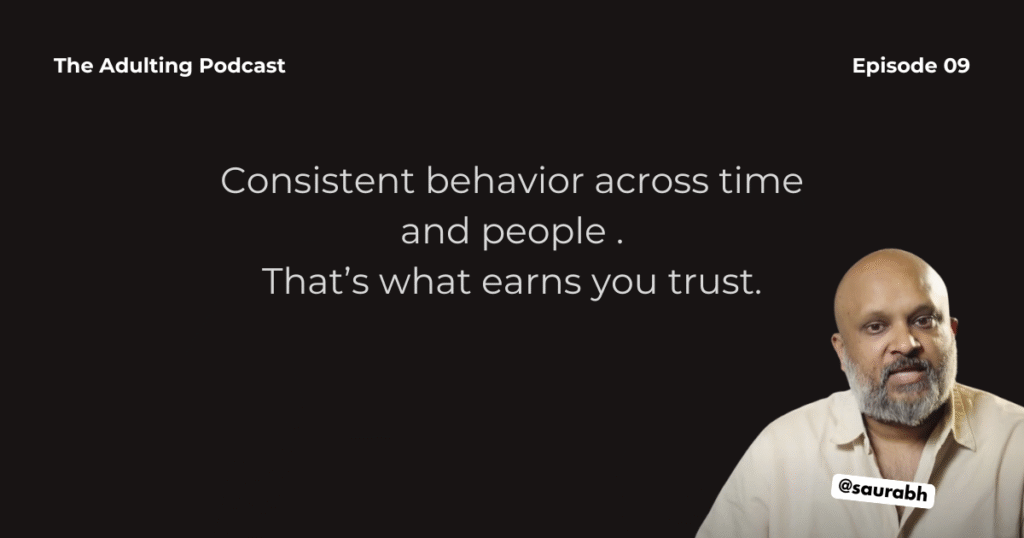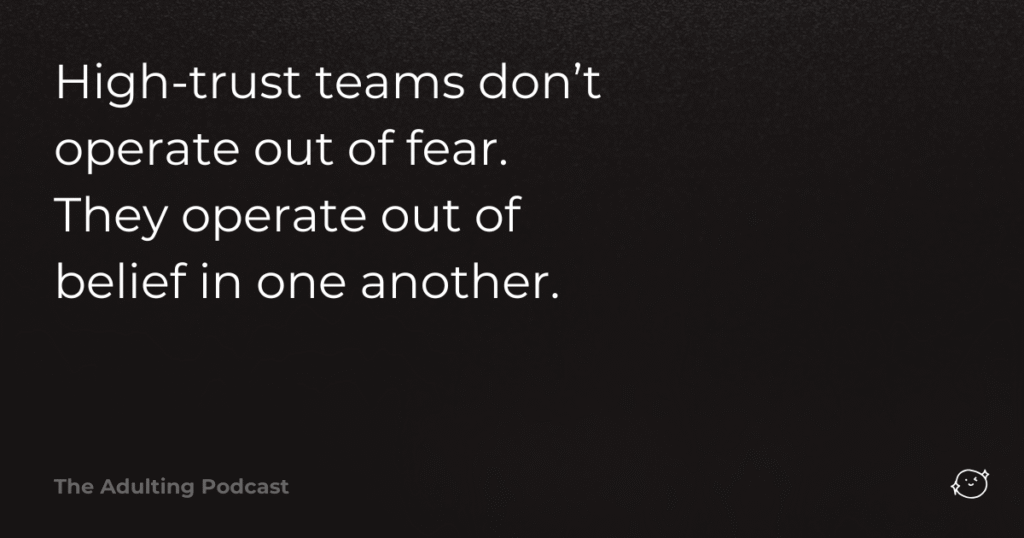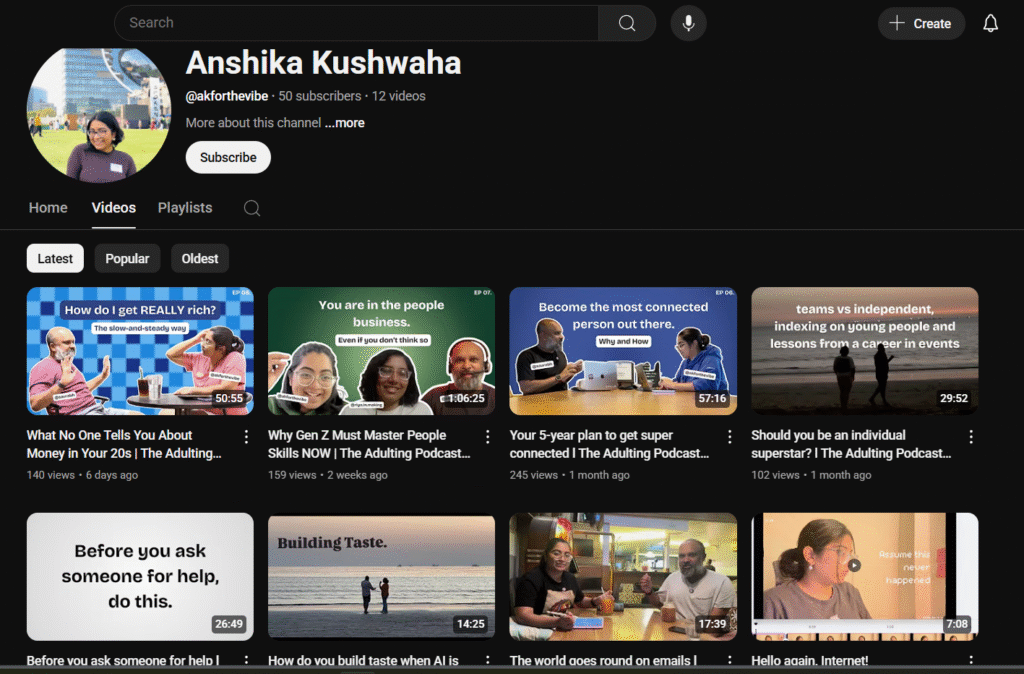Trust is the invisible glue that holds teams, businesses, and even societies together. Without it, workplaces crumble, relationships falter, and progress stalls. In Episode 09 of The Adulting Podcast, co-hosts Saurabh and Anshika discuss about the art and science of high-trust businesses, sharing practical strategies to foster trust in teams, overcome personal barriers, and navigate low-trust environments. Drawing from real-world examples—like shopkeepers in Bangkok leaving stores unlocked to C4E’s payment reliability—this episode is packed with insights for anyone looking to thrive in work and life.
Why Trust Drives Success
Trust isn’t just a feel-good concept; it’s a game-changer for efficiency and growth. In Bangkok, shopkeepers hang a “Be Right Back” sign and leave their stores open, trusting strangers not to steal. Compare that to India, where leaving a wallet on the street is a guaranteed loss. This contrast highlights a core truth: high-trust environments eliminate friction, save time, and unlock potential. In business, trust means stakeholders—employees, clients, partners—feel secure, leading to smoother operations and stronger relationships.
1. Define a High-Trust Business
What exactly is a high-trust business? It’s a workplace where every stakeholder—employees, clients, partners—knows they won’t be shortchanged. Saurabh contrasts Bangkok’s trust-based shops with India’s skepticism:
“In India, trust is zero. If you tell someone you’ll work for ₹500, they try to squeeze six out of five.”
A high-trust business flips this script by ensuring promises are kept, payments are timely, and transparency reigns. This foundation of trust boosts efficiency, reduces stress, and creates a workplace where everyone thrives.
2. Remove Financial Fear to Foster Trust
Money is a major trust hurdle. When employees or partners worry about delayed payments, it erodes confidence. At C4E, the approach is to remove this fear entirely by guaranteeing timely payouts, even if it means absorbing losses—like the ₹5 lakh hit they took when a client didn’t pay. This creates a safe space where people can focus on their work. In your own life, set clear financial expectations with colleagues or clients. For example, agree on payment terms upfront to avoid misunderstandings and build trust through reliability.
3. Build Trust with Consistent Actions

Consistency is the cornerstone of trust. Whether it’s meeting deadlines, honoring agreements, or showing up as promised, repeated actions build confidence. Saurabh shares,
“If I have to take a loan in my name, I do that. If I have to beg people, I do that,”.
For young professionals, this means showing up consistently—whether it’s meeting deadlines or honoring small commitments. Over time, consistency turns into a reputation that opens doors and strengthens teams.
4. Navigate Low-Trust Workplaces
Starting a new job in a distrustful environment is daunting. If your boss or colleagues don’t trust you, the workplace can feel like a minefield. The advice? Take control where you can. Build alliances with trustworthy peers, seek out mentors, and identify why distrust exists—is it a toxic culture or misaligned priorities? If the environment stifles your growth, consider leaving. Life’s too short to stay in a place that doesn’t let you thrive. Focus on creating your own trust network, even in a low-trust setting.
5. Overcome Personal Trauma to Trust Again
Past betrayals can make trusting others—or yourself—feel impossible. Saurabh’s answer is practical: find one guiding voice.
“Don’t go to multiple gurus. Find one person and say, ‘I’ll follow you blindly.’”
This could be a mentor, a trusted friend, or an online figure whose values resonate. By following a single path, you create structure to overcome trauma and rebuild confidence. Start by identifying one person whose advice you trust, then commit to their guidance for clarity and progress.
6. The Associative Property of Trust
Building trust across a team requires intentional effort. One powerful concept shared is the Associative Property of Trust: if A trusts B, and B trusts C, A should trust C.
To make this work, encourage one-on-one conversations, assign collaborative tasks, and foster open communication. For example, team members can be given autonomy to engage in key discussions, building a sense of ownership and trust. In your team, try small trust-building exercises like paired projects or regular check-ins to strengthen bonds.
7. India’s Trust Deficit: A Cultural Challenge
India’s trust deficit often stems from a comparison-driven culture. The “Sharma ji ka beta” mindset—where success is measured against others—breeds suspicion. Instead of celebrating a colleague’s win, people assume shortcuts or foul play. To counter this, focus on your own growth and assume goodwill in others. For instance, if a coworker lands a big project, congratulate them instead of questioning their methods. Shifting from comparison to collaboration builds trust and fosters a healthier work environment.
8. Adopt a Trust-First Mindset

Trusting others is a risk, but it’s also a strength. Start by assuming goodwill, but set clear boundaries—if someone betrays your trust, cut ties decisively. This approach lets you build relationships while protecting your energy. In practice, this could mean giving a new colleague the benefit of the doubt or being upfront about expectations in a project. Trust-first doesn’t mean being naive; it means leading with openness and learning from any setbacks
Enjoyed This Episode? You Might Also Like:
What No one Tells You About Money In Your 20s – The Adulting Podcast (Ep. 08)
TL;DR – Trust-Building Takeaways
- Know high-trust businesses: Deliver on promises for stakeholder security.
- Stay consistent: Build trust through reliable, repeated actions.
- Remove money fears: Ensure timely payments to create safety.
- Handle low-trust settings: Build alliances or seek better environments.
- Overcome trauma: Follow one mentor’s values for clarity.
- Strengthen teams: Foster trust with tasks and open communication.
- Counter cultural distrust: Avoid comparison, assume goodwill.
- Trust first: Lead with openness but set firm boundaries.
SEE MORE LIKE THIS

Welcome to The Adulting Podcast. Hosted by Anshika and Saurabh, this podcast is your go-to for navigating the messy, exciting world of your 20s—careers, relationships, and everything in between. We’re sharing real lessons, hard-won insights, and practical tips to help you thrive, whether you’re just starting out or seeking clarity years into your journey.
If you love, like, or even hate what you hear, drop us a line at @akforthevibe and @saurabh.

Leave a Reply